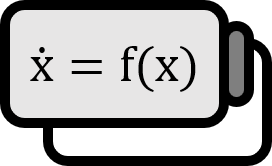호모클리닉 바이퍼케이션
Definition
Homoclinic Bifurcation is a bifurcation where homoclinic orbits appear or disappear as the parameters of the dynamical system change.
Description
Homoclinic bifurcation, as its name suggests, is related to homoclinic orbits. It can be imagined as an image where a limit cycle and saddle point meet as their positions change with the parameters. Since one cannot deduce the inclusion of homoclinic orbits by merely observing the vicinity of the saddle point, it is also considered a global bifurcation.
Example 1
$$ \begin{align*} \dot{x} =& y \\ \dot{y} =& \mu y + x - x^{2} + xy \end{align*} $$ Consider a system as given above. This system has two fixed points $v_{0} = (0, 0)$ and $v_{1} = (1, 0)$, and bifurcation occurs at the critical value $\mu_{c} \approx -0.8645$.
$\mu < \mu_{c}$

Fundamentally, $v_{0}$ is a saddle, and the unstable fixed point $v_{1}$ produces a flow that follows the manifold involving the saddle to form a limit cycle. As $\mu < \mu_{c}$ approaches $\mu_{c}$, the limit cycle surrounding $v_{1}$ becomes closer to $v_{0}$.
$\mu \ge \mu_{c}$

As $\mu$ increases and reaches $\mu = \mu_{c}$, a homoclinic orbit appears, and if it becomes larger than $\mu_{c}$, the homoclinic orbit disappears again.
See Also
Strogatz. (2015). Nonlinear Dynamics And Chaos: With Applications To Physics, Biology, Chemistry, And Engineering(2nd Edition): p263. ↩︎
